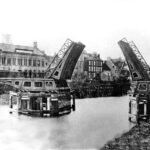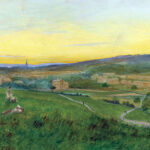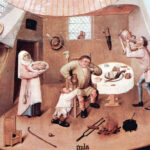4 May 1807: Lord Milton welcomes 10,000 to his 21st birthday barbecue at Wentworth Woodhouse, Rotherham, during his campaign to be elected MP for the Whigs
W.S. Cameron. 1881. A Famous Election Contest. Old Yorkshire. Ed. William Smith. London: Longmans, Green, and Co. Get it:
.Unedited excerpt
If an excerpt is used in the book, it will be shorter, edited and, where applicable, translated.
It was at the general election consequent upon the dissolution in 1807 that in this county of York a great struggle was waged and a great victory won. Only a few men are living whose memory goes back so far; there is no one who can tell from personal recollection how keenly the wide county was agitated by the contest; but all the evidence that need be sought on the point is given with partisan fulness in the weekly journals of the time. Mr. Wilberforce and Mr. Walter Fawkes were the retiring members. Mr. Wilberforce sought re-election, and his claim to a seat was not disputed. It was possible also that had Mr. Fawkes cared to come forward again, Yorkshire would have been spared the conflict into which in these days of its two members it was plunged. Mr. Fawkes was, however, so annoyed at the dissolution that he determined to retire from public life… From two great Yorkshire houses candidates were selected for the coveted seat: Lord Milton [Charles Wentworth-Fitzwilliam], the son of Earl Fitzwilliam, representing the Whig party; and the Hon. H. Lascelles, the son of Lord Harewood, being the champion of the Tories. Lord Milton’s address was issued on April 29th, and it was not until May 4th that he came of age. The celebration of his majority coming in the midst of his candidature naturally heightened the interest in both events. Rain fell heavily on the day of his twenty-first anniversary; yet, to do honour to him and to join in the festivities, ten thousand persons gathered together in Wentworth Park. For the entertainment of such a multitude of guests, great preparations were made, and money was not spared. Two oxen weighing together 240 stone – “the fairest and fattest beasts,” says the newspaper record, “ever grazed in this county” – were roasted whole on the lawn. Ten thousand gallons of strong ale, twenty sheep roasted in quarters, and untold quantities of beef and bread, were distributed amongst the spectators. In the campaign the youth of Lord Milton was urged against his selection, and the candidate’s reply to the taunt of his juvenility was that rendered famous by Lord Chatham that the longer he lived, the more he would remedy that fault!
Comment
Comment
Smith continues (and I hope someone will explain the Melville and bugbear references):
George Stephenson had not then been heard of, and although the lightning had been carried down the kite string, its application to man’s needs had yet to be worked out; there were no railways, and the swiftest message that could be sent was carried by the lumbering mail coach. An election for a county was consequently not a question of a day. The poll on this occasion lasted over two weeks. It was thought that it would be concluded in six days, but the fifteenth day was reached before the sense of the county was taken. As was the custom, the polling took place in the Castle Yard at York, and thither the freeholders had to journey from all parts of the county. There were thirteen booths, each with the names of certain wapentakes, and each elector went to the booth of the wapentake where his freehold lay. Between the date of their addresses and the close of the poll, the candidates held numerous meetings, and party feeling ran very high. On May 5th, Lord Milton and Mr. Lascelles made their appearance in the Leeds Cloth Hall-yard. Lord Milton is reported to have had a magnificent reception; and in contrast with his speech was printed that of Mr. Lascelles, which was given in two sentences, namely, “Silence, gentlemen, silence;” “Pray, gentlemen, be silent.” The friends of the latter candidate denied that their nominee was refused a hearing, and they issued a circular setting forth that his reception was highly flattering, “and the attendance upon him the most numerous and respectable ever experienced!” The squibs issued were innumerable. Many of them on both sides were in bad taste, and made attacks of a kind that would not now be tolerated. The two following appeals are printed as showing the questions at issue :
AGAINST LORD MILTON.
No imbecile infant of a factious aristocracy – No trampling on Kings – No Popery – No Irish Papists – No Milton.AGAINST MR. LASCELLES.
No enemy to the clothiers – No defender of Melville – No Bugbear – No slave-dealing Lord – No Yorkshire votes purchased with African blood – No Lascelles; no, never – Milton for ever – God save the King!During the days of the polling 1 the county was in a ferment of excitement, and the roads leading to York were, it is said, covered night and day with horsemen and carriages. The way in which the votes fluctuated greatly increased the interest taken in the contest. On the first day Mr. Lascelles was ahead of his opponent by 774 votes to 656. On the second day the tide changed – Milton, 1,095; Lascelles, 914. On the third day Lord Milton was still at the front. On the fourth day the positions were again changed, the figures being 1,195 for Lascelles, and 1,122 for Milton. Mr. Lascelles kept his lead from this time up to the thirteenth day of the polling, when the numbers were – for Milton, 10,313 ; Lascelles, 10,225. Then came a terrific struggle. It is impossible to exaggerate the excitement which animated both sides, but the jubilation of the Fitzwilliam party may easily be imagined when the announcement showed that their candidate was the winner in the conflict by a majority of 187 votes. He had received 9,000 plumpers, The return reads:
Mr. Wilberforce 11,803 votes.
Lord Milton 11,177 ”
Mr. Lascelles 10,990 ““But dearly was that victory bought.” It is stated that the contest cost Earl Fitzwilliam and Lord Harewood as much as £100,000 each [ca. £10 million in 2021]. The result was the occasion of great rejoicing among the Whig families in London.
An amusing article re the involvement of descendant Viscount David Lascelles in producing the (West Indian) Carnival Messiah in Leeds.
Joseph Farington on Wilberforce’s election:
Mrs. Campion had seen a person from Yorkshire who had supported Mr. Wilberforce. He said that Mr. Wilberforce was becoming daily more unpopular, & that had the election been continued 3 or 4 days longer he would have lost it. He is spoken of as an Hypocrite in his profession of Religion, for whilst He calls himself a member of the Church of England, He is building or encourages the building of Chapels & Conventicles for Sectaries. She added that it was said that He will never again be returned for Yorkshire—such are the floating opinions (Farington 1924).
Something to say? Get in touch
Similar
 1 July 1840: The opening of the Hull and Selby Railway terminates the threat to Hull’s port from Goole, Scarborough and Bridlington
1 July 1840: The opening of the Hull and Selby Railway terminates the threat to Hull’s port from Goole, Scarborough and Bridlington 30 May 1835: Alfred Austin, future poet laureate, “Banjo-Byron that twangs the strum-strum,” is born into rural splendour at Ashwood, 48 Headingley Lane, Leeds
30 May 1835: Alfred Austin, future poet laureate, “Banjo-Byron that twangs the strum-strum,” is born into rural splendour at Ashwood, 48 Headingley Lane, Leeds 22 September 1465: A menu for the enthronement at Cawood Castle of George Neville as Archbishop of York
22 September 1465: A menu for the enthronement at Cawood Castle of George Neville as Archbishop of York 15 October 1838: Apologies from “imprisoned” Huddersfield workers are read to the great Chartist rally on Peep Green (Hartshead Moor), accusing middle-class radicals of betrayal
15 October 1838: Apologies from “imprisoned” Huddersfield workers are read to the great Chartist rally on Peep Green (Hartshead Moor), accusing middle-class radicals of betrayal
Comment
Comment
Something to say? Get in touch
Search
Donate
Music & books
Place-People-Play: Childcare (and the Kazookestra) on the Headingley/Weetwood borders next to Meanwood Park.
Music from and about Yorkshire by Leeds's Singing Organ-Grinder.


 Bluesky
Bluesky Extwitter
Extwitter